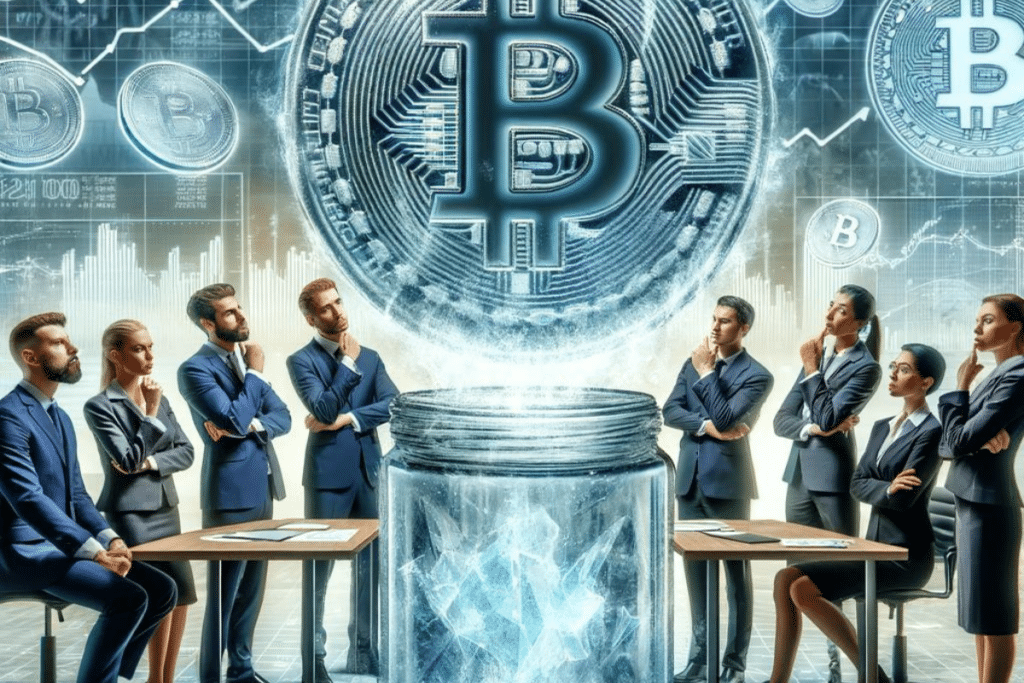Bitcoin has no value: Jamie Dimon is right according to Peter Schiff
In the heart of the digital era, where cryptocurrencies, led by Bitcoin, are making headlines, a burning question divides financial experts: does BTC have real value? Prominent voices like Jamie Dimon and Peter Schiff believe the answer is no. But then, what gives bitcoin its value? Is it merely a house of cards ready to collapse, or is there a deeper value behind its enigmatic digital façade, perhaps less tangible but no less real?

Bitcoin: A Currency Without Inherent Value?
Bitcoin, a purely digital creation by Satoshi, is distinguished by its lack of physical form.
Jamie Dimon, CEO of JPMorgan Chase, renewed his skepticism towards bitcoin at the World Economic Forum in Davos. Comparing crypto to a “pet rock“, he doubts any intrinsic value. Dimon has underscored his concerns, highlighting the potential illicit use of Bitcoin. These comments cast doubts on the credibility and utility of the digital currency.
Peter Schiff, a staunch critic of BTC, supports Dimon’s view. Unlike gold, which has proven its value over the ages, Bitcoin lacks tangible substance. It rests solely on the consensus of its user community – a volatile and potentially fleeting trust.
The extreme volatility of Bitcoin is often cited as evidence of its intrinsic fragility. The wild price swings render BTC unpredictable, disqualifying it, according to some experts, as a reliable store of value. This financial instability highlights the speculative aspect of Bitcoin, distancing it from the image of a stable and enduring currency.
Despite these criticisms, one cannot ignore the enormous amount of energy dedicated to Bitcoin mining. This energy, representing a tangible and significant cost, could it be seen as a form of intrinsic value? Some might argue that the energy invested in creating and maintaining the BTC network endows it with certain value, albeit indirect.
Bitcoin vs. Gold: An Unequal Fight?
Compared to gold, an ancestral asset celebrated for its undeniable value and utility, Bitcoin, though younger, proves to be a bold innovator in the financial world. Far from being a mere passing trend, Bitcoin may represent the next major revolution in our understanding and use of money. With the recent approval of Bitcoin Spot ETFs on January 10, 2024, this cryptocurrency crosses a new threshold of legitimacy and institutional acceptance.
The decentralized nature and lack of regulation of Bitcoin, once sources of concern, are now seen as significant advantages, symbolizing freedom and innovation in the financial sector. These features offer a transparent and democratic alternative to traditional monetary systems, while strengthening investor interest and confidence.
While Peter Schiff and other critics doubt its stability, Bitcoin continues to gain in popularity and acceptance, proving that it is much more than a mere “bubble”. It is a currency that adapts and evolves, reflecting technological advancements and changes in our society.
Like gold, Bitcoin has managed to carve out a coveted place in the global economy. In the vast financial theater, BTC is not just a leading actor; it is the pioneer of a new financial era, captivating the world with its revolutionary potential.
Maximize your Cointribune experience with our "Read to Earn" program! For every article you read, earn points and access exclusive rewards. Sign up now and start earning benefits.

Fascinated by Bitcoin since 2017, Evariste has continuously researched the subject. While his initial interest was in trading, he now actively seeks to understand all advances centered on cryptocurrencies. As an editor, he strives to consistently deliver high-quality work that reflects the state of the sector as a whole.
The views, thoughts, and opinions expressed in this article belong solely to the author, and should not be taken as investment advice. Do your own research before taking any investment decisions.